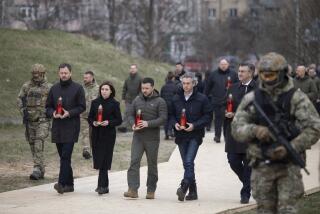‘Special Units’ Blamed for the Worst Atrocities
- Share via
BELGRADE, Yugoslavia — Natasha Kandic, whose human rights work has made her enemies on both sides of the ethnic divide, is convinced that special troops commanded from Belgrade, the Yugoslav and Serbian capital, committed the worst war crimes in Kosovo.
“They had specific tasks,” said Kandic, whose Belgrade-based Humanitarian Law Center is assisting the International Criminal Tribunal for the Former Yugoslavia in its investigations. “One unit for burning, one for expulsions.”
Soldiers and police seeking revenge, as well as criminals, probably were behind some of the killings too, Kandic said.
“In many cases, I saw that local police and local security forces were not involved in the orders,” she added. “Special units could carry out the tasks quickly, and they are not in the local [command] structure.
“They don’t trust young soldiers. And in many cases, young soldiers said they heard something, but they don’t know about the events in Kosovo because they were on the border or in the woods.”
Kandic and her staff of Serbs and ethnic Albanians have long experience investigating human rights abuses and alleged war crimes in Kosovo--a Yugoslav province cherished by Serbian nationalists and dominated by an ethnic Albanian majority.
In Djakovica, where ethnic Albanian survivors have reported some of the worst atrocities, Serbian gunmen killed hundreds of civilians in a district from which Kosovo Liberation Army guerrillas had launched attacks, Kandic said.
“During the first days of NATO bombing, the KLA was in the old part of the city and tried to enter further,” she said. “Of course, police and ‘additional formations’ were fighting them.
“After that, the [Serbs] burned all of the old city. In Pec, on May 7 and 8, Serbian police attacked a part of town because the KLA had been there the whole time.
“The police entered, divided the men from women and children, and killed maybe 800 or 700 people. After the fighting stopped, when police entered the houses, civilians were punished because they supported the KLA.”
More to Read
Sign up for Essential California
The most important California stories and recommendations in your inbox every morning.
You may occasionally receive promotional content from the Los Angeles Times.










